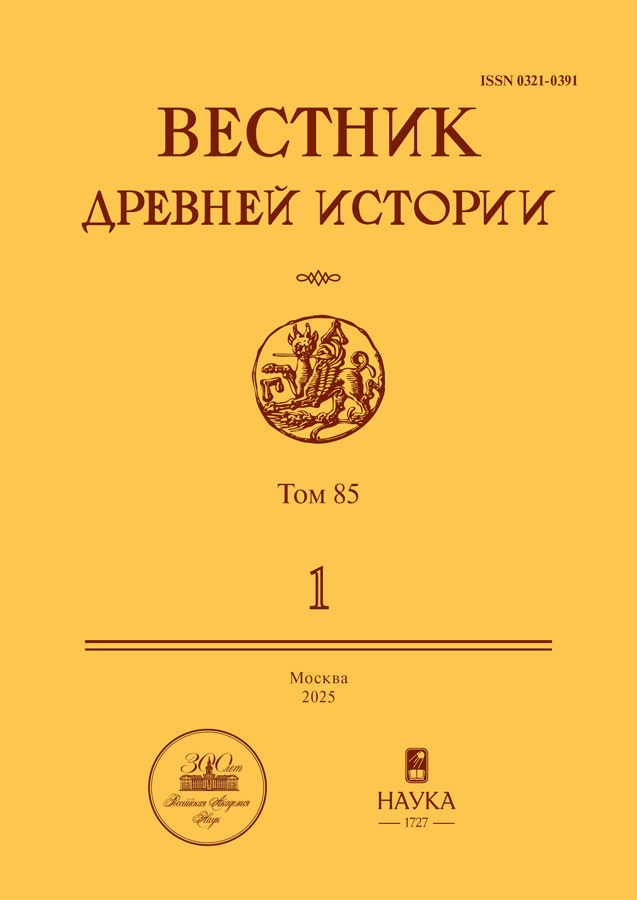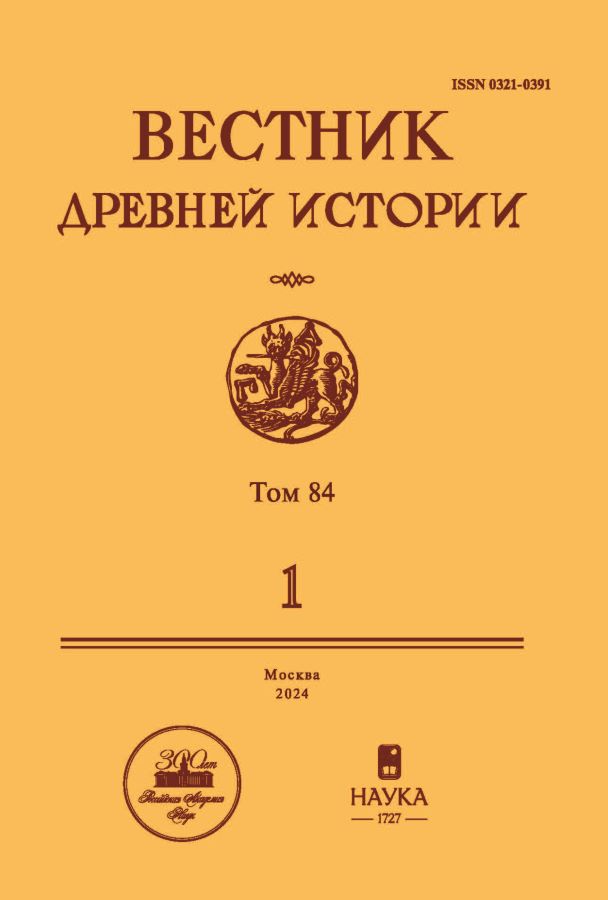Бокх глазами Саллюстия: штрихи к портрету
- Авторы: Короленков А.В.1,2
-
Учреждения:
- Государственный академический университет гуманитарных наук
- Псковский государственный университет
- Выпуск: Том 84, № 1 (2024)
- Страницы: 107-118
- Раздел: Статьи
- URL: https://archivog.com/0321-0391/article/view/648626
- DOI: https://doi.org/10.31857/S032103910025868-7
- ID: 648626
Цитировать
Полный текст
Аннотация
В статье рассматривается изображение мавретанского царя Бокха в Bellum Iugurthinum Саллюстия. Первоначально он выступает как марионетка Югурты и собственных советников, подкупленных нумидийским царем, но вскоре начинает действовать вполне самостоятельно, не являясь надежным партнером ни для римлян, ни для нумидийцев. В центре внимания Саллюстия бесконечные колебания Бокха (предать Югурту или римлян) и перемена им решений, которые, однако, не всегда сопровождаются какими-либо действиями. Римский писатель называет Бокха bаrbarus и обвиняет его в fides Punica, тогда как в адрес Югурты такие обвинения не звучат. Саллюстий утверждает, что цари часто вступают в противоречие с самими собой (Iug. 113.1), но Бокх остается вполне верен себе, поскольку суть его характера, как он показан у Саллюстия, именно в противоречиях, которые и отражаются в его бесконечных колебаниях и перемене решений.
Ключевые слова
Полный текст
Об авторах
Антон Викторович Короленков
Государственный академический университет гуманитарных наук; Псковский государственный университет
Автор, ответственный за переписку.
Email: sallust@list.ru
ORCID iD: 0000-0002-3628-2754
кандидат исторических наук, доцент ГАУГН, научный сотрудник лаборатории «Центр комплексного изучения проблем региональной безопасности»
Россия, Москва; ПсковСписок литературы
- Büchner, K. 1953: Der Aufbau von Sallusts Bellum Iugurthinum. Wiesbaden.
- Büchner, K. 1982: Sallust. 2. Aufl. Heidelberg.
- Chlup, J. Th. 2013: Sallust’s Melian Dialogue: Sulla and Bocchus in the Bellum Iugurthinum. Dialogues d’Histoire Ancienne Supplement 8, 191–207.
- Feldherr, A. 2021: After the Past: Sallust on History and Writing History. Chichester.
- Gsell, S. 1928: Histoire de l’Afrique du Nord. T. VII. La République romaine et les rois indigènes. Paris.
- Klebs, E. 1897: Bocchus 1. In: RE. Hlbd. 5, 577–578.
- Koestermann, E. (Hrsg.) 1971: C. Sallustius Crispus. Bellum Iugurthinum. Heidelberg.
- La Penna, A. 1959: L’interpretazione sallustiana della guerra contro Giugurta (continuazione e fine). Annali della Scuola Normale Superiore di Pisa. Lettere, Storia e Filosofia. Serie II 28/3–4, 243–284.
- Lauckner, C. 1911: Die künstlerischen und politischen Ziele der Monographie Sallusts über den Jugurthinischen Krieg. Diss. Leipzig.
- Oniga, R. 1990: Il confine conteso. Lettura antropologica di un capitolo sallustiano (Bellum Iugurthinum 79). Bari.
- Paul, G.M. 1984: A Historical Commentary on Sallust’s Bellum Jugurthinum. Liverpool.
- Santangelo, F. 2019: Sulla in the Bellum Jugurthinum. In: A. Eckert, A. Thein (eds.), Sulla Felix: Politics and Reception. Berlin–Boston, 107–124.
- Schmal, S. 2001: Sallust. (Studienbücher Antike, 8). Hildesheim.
- Schnorr von Carolsfeld, H. 1888: Über die Reden und Briefe bei Sallust. Leipzig.
- Schur, W. 1934: Sallust als Historiker. Stuttgart.
- Sensal C. 2001: Salluste, Iug. 110: une réminiscence de Sylla? Les Études Classiques 69, 65–74.
- Shaw, E.H. 2021: Sallust and the Fall of the Republic: Historiography and Intellectual Life at Rome. Leiden–Boston.
- Steidle, W. 1958: Sallusts historische Monographien: Themenwahl und Geschichtsbild. (Historia, Einzelschriften, 3). Wiesbaden.
- Tiffou, E. 1973: Essai sur la pensée morale de Salluste à la lumière de ses prologues. Montreal–Paris.
- Vretska, K. 1955: Studien zu Sallusts Bellum Jugurthinum. Wien.
- Wiedemann, Th. 1993: Sallust’s ‘Jugurtha’: Concord, Discord, and the Digression. Greece & Rome 40/1, 48–57.
- Windberg, F. 1937: Numidia. In: RE. Hlbd. 34, 1343–1397.
Дополнительные файлы











